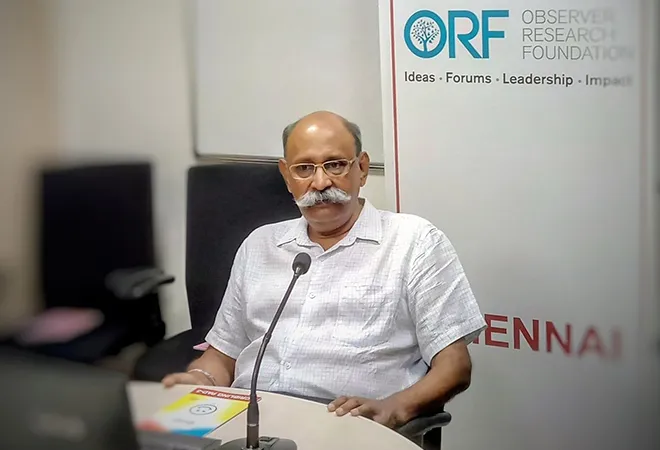-
CENTRES
Progammes & Centres
Location

“In Jammu and Kashmir, every opportunity is a threat, and every threat an opportunity, consequently our strengths are also our weaknesses,” according to Lt-Gen P R Shankar (retd).
Initiating a discussion on ‘J&K: Combating Terrorism, the way forward’ at the ORF-Chennai Chapter, Gen Shankar, who is now associated with the Department of Aerospace Engineering, IIT Madras, said: “It is important when looking at combating terrorism in Jammu and Kashmir, not simply to look for one solution, but to discuss a broad range of options.”
The challenges of this region were many. Gen Shankar enumerated the “fractured politics” as among the main causes of discord. In the present context, “tensions between the main political parties in the State, namely, the ruling BJP at the Centre, the Congress, the PDP, and the National Conference, are jostling for power”, and this has contributed to the State’s problems.
There is a widening gulf between opinions at the Centre and the State. The threats to security due to the link between separatists and adversarial Pakistan continue, he said. In addition to these challenges, Gen Shankar regretted that “industry is completely dead in J&K. Hence, there are no jobs and no income for the youth, whose situation is hopeless. The freebies and social subsidies have further led to lack of incentive to earn”.
“An entire generation of Kashmiris have only lived under the gun, seeing military operations at their doorstep and this has led to a deep sense of alienation,” observed Gen Shankar. He further pointed out that the “old leadership is being replaced by hard liners.” There was also a worrying new trend in J&K which was the targeting of security forces, Gen. Shankar said.
Looking at the future of J&K, it is important to understand the strategic motivations of Pakistan and China, said Gen Shankar. For Pakistan, he believed that “Kashmir is unfinished agenda from the Partition, and its army is fully in control of its nuclear assets.” However, economically, Pakistan is bankrupt with the government debt-to-GDP ratio put at a staggering 86 percent. The nation is highly dependent on China and Saudi Arabia for funding.
China, on its part, is very focused on the China-Pakistan Economic Corridor (CPEC), as a part of the larger BRI. The CPEC is crucial for China to meet its economic and energy goals. Additionally, Gen Shankar believed that it is in China’s interest to keep India tied down in the Himalayas, as this would free up the strategic space in the Indian Ocean Region. In this regard, for India, Chabahar is a crucial challenger to the CPEC, he said.
Afghanistan is also a key part of the J&K puzzle. The security implications of the US withdrawal from Afghanistan are huge for India. Pakistan is looking to be a key player in Afghanistan. The withdrawal of the US forces will lead to a surplus of Taliban fighters who could potentially shift their attention to Kashmir, said the Lt. Gen. Shankar. From a strategic standpoint, it was important to keep the India-Iran-Afghanistan partnership engaged, which should be driven by Chabahar port, oil diplomacy and congruence of interests in Afghanistan.
The way forward should be assessed against a background of changing realities in the international system marked by the “US withdrawal from Afghanistan, a bankrupt Pakistan seeking strategic space in Afghanistan, a cooling Chinese economy and an emerging India albeit amidst an upcoming hyped up general elections,” Gen Shankar explained. The solutions to J&K should be in consonance with the emerging environment, he further added.
“It is important to have national resolve and deep-rooted commitment beyond the election rhetoric at the centre,” Gen Shankar said. At the State level, the focus had to be the people, with an emphasis towards de-alienation and integration. This should be done through reviving local industry, tourism and modernising education. Youth clubs, sports leagues and adventure activities could also be encouraged. “Sufism, which was once the hallmark of Kashmiri culture, now entirely dead in the valley, must be revived to counter radicalism,” he added.
In conclusion, Gen Shankar said: “We need to take a step back, stabilise the situation, think coolly, take informed decisions and act deliberately for a long-lasting resolution of the problem. The approach to J&K must be balanced and not uni-dimensional. In all cases, the military solution is the last option. We must find a political solution.”
This report was prepared by Dr Vinitha Revi, Research Associate, Observer Research Foundation, Chennai
The views expressed above belong to the author(s). ORF research and analyses now available on Telegram! Click here to access our curated content — blogs, longforms and interviews.